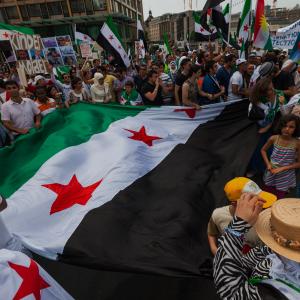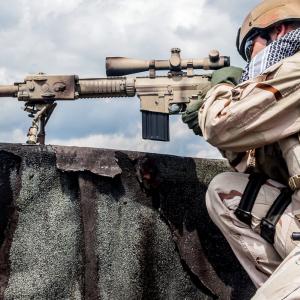
Stephen Zunes, author of Civil Resistance Against Coups, coordinates the Middle Eastern Studies program at the University of San Francisco.
Posts By This Author
When a Ceasefire Is Not Enough
THE WAR BETWEEN Armenia and Azerbaijan this past autumn was an avoidable tragedy.
The disputed Nagorno-Karabakh region has been populated since at least the second century B.C.E. by Armenians, one of the world’s oldest Christian civilizations. The Muslim Azeris and others have lived there and in neighboring areas for centuries as well, and the region was ethnically mixed (albeit majority Armenian) when the Soviet Union collapsed in 1991.
Stalin’s divide-and-rule policy for drawing borders made Nagorno-Karabakh a theoretically “autonomous region” within the Azerbaijani Soviet Socialist Republic. As the Soviet Union was breaking up and Azerbaijani persecution of ethnic Armenians increased, the Armenian and Nagorno-Karabakh governments, with widespread support of their respective populations, demanded the transfer of the region to Armenia.
When Azerbaijan refused, Armenia seized the territory by force in the 1990s—along with large swaths of western Azerbaijan, populated primarily by Azeris, that were never part of Nagorno-Karabakh. Hundreds of thousands of Azeris, and a smaller number of Armenians, were victims of ethnic cleansing by both sides.
Politicians Are Not Going to Hold Saudi Arabia Accountable
But can we?
Adding Fuel to Fire
THE CONTROVERSIAL Jan. 29 attack by U.S. forces on a rural township in Yemen exemplifies the failed U.S. policy in the region.
In the first military raid carried out by the Trump administration, one U.S. soldier and at least 25 civilians were killed in the attack on the village of al-Ghayil in central Yemen, including nine children under the age of 13. Among these was 8-year-old Nawar al-Awlaki, an American citizen, who was shot in her family’s house. Other civilians killed included visitors whose family has been active in U.N.-mediated de-escalation committees, working to quell violence in the region.
Some leaders of al Qaeda in the Arab Peninsula (AQAP) also lived in al-Ghayil. AQAP has taken advantage of Yemen’s multi-sided civil war to find refuge in remote areas. AQAP maintains an uneasy relationship with local tribes, many of whom abhor al Qaeda’s violent excesses and reactionary interpretation of Islam but respect AQAP’s ability to fight common enemies.
When Navy SEALs found themselves under fire, they called in airstrikes. The barrage hit houses where families slept, killing people and livestock. Navy SEAL William “Ryan” Owens was also killed.
President Trump initially blamed his own generals and former President Obama for the botched raid. Then, in his first address to Congress, Trump pivoted, describing it as “a highly successful raid that generated large amounts of vital intelligence.” Owen’s widow was present; Trump referred to her multiple times in his address. Owen’s father refused to meet with the president and asked for an investigation into his son’s death.
What Will Peace Require?

olivier borgognon / Shutterstock
THE MOST CRITICAL priority for the international community regarding Syria—in addition to addressing the immediate humanitarian needs—is to implement a cease-fire in as much of the country as possible. An arms moratorium on both the regime and rebel groups must be implemented and strictly enforced. And negotiations for a more democratic and representative government should move forward, even if it initially includes important foreign and domestic elements who do not share those values.
Especially in response to Russian military actions in Syria, President Obama is being pressured by both Republicans and Democratic hawks to militarize the situation further by sending more arms to rebel groups and increasing direct U.S. military involvement. As problematic as such military responses may be, the diplomatic alternatives aren’t much better.
Some of the most powerful opposition forces—the so-called Islamic State (ISIS) and other hardline Islamists in the al- Nusra Front—appear to have little interest in negotiations. And the prospect of working out an arrangement that would keep in power Assad’s brutal regime, which has been responsible for the vast majority of the more than 100,000 civilian deaths in the nearly five-year conflict, is extremely hard to accept.
Unfortunately, unlike most dictatorships that have been overthrown by armed or unarmed struggle in recent decades, the power in Damascus does not rest in the hands of a single dictator. Assad heads a longstanding ruling apparatus led by the Baath Party and the military that, despite its corruption and brutality, still has a social base. A fairly large minority of Syrians—consisting of Alawites, Christians and other minority communities; Baath Party loyalists and government employees; the professional armed forces and security services; and the largely Sunni crony capitalist class that the regime has nurtured—still cling to Assad’s government.
They constitute a large enough segment of Syrian society so that no anti-regime struggle can win without cascading defections, which is unlikely when the alternative is perceived to be rule by totalitarian Salafists such as ISIS.
During the first six months of the uprising in 2011, when the anti-regime movement was largely nonviolent, pro-democratic, and more diverse in terms of support, it appeared the regime could be eventually toppled. Now, in the context of armed struggle and the rise of Islamist extremists, many who once were working to topple the regime see it as the lesser evil.
What About Gadhafi?
Does bloody civil war in Libya mean nonviolence has its limits?


